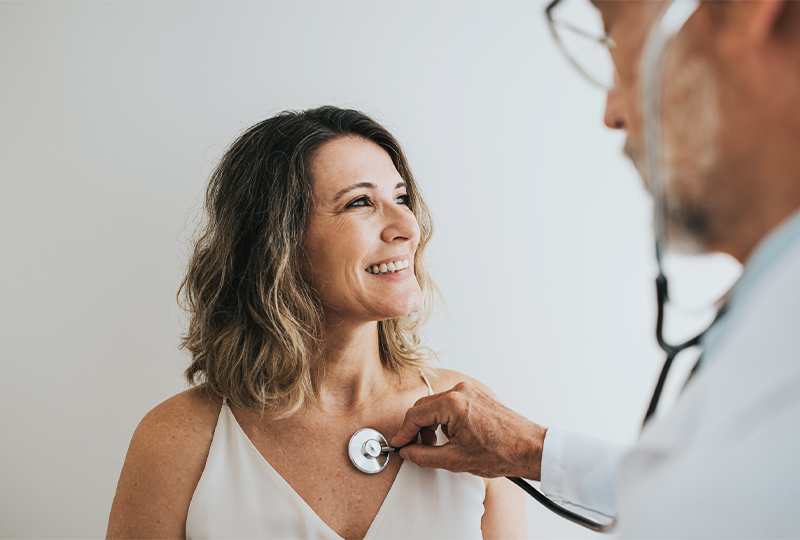Follow this advice to get on the path to heart health and wellness.
The bad news: Heart disease is the leading cause of death in Tennessee. It’s also the No. 1 cause of death among women nationally, resulting in one out of every three deaths per year.
The good news: There are plenty of ways, from leading a heart-healthy lifestyle to getting regular checkups with your physicians, to reverse the damage — or to even prevent it from happening. Here, we’re rounding up the best My Vanderbilt Health advice on cardiovascular health so that you can empower and educate yourself in the fight against this disease. The more you know, the better you’ll be able to protect yourself and your family.
Understanding heart disease
Heart-healthy diet
You have control over what you eat, which is one of the biggest influences on your heart health. With a few mindful diet changes, you can make great strides toward managing — or preventing — cardiac concerns.
- Keep enjoying foods you love, but with some heart-minded substitutions: olive oil for vegetable oil, whole-wheat flour for white flour, skim milk for whole milk, herbs for salt, etc.
- Consider following the DASH diet (Dietary Approaches to Stop Hypertension) to keep your blood pressure in check.
- Read nutrition labels closely to check for sodium, and eat more home-cooked meals to avoid processed, salty foods.
- Limit alcohol. A serving is a 5-ounce glass of wine, a 12-ounce beer or 1.5 ounces of hard liquor; women should have no more than one a day, men no more than two.
- Choose homemade versus off-the-shelf, like these easy-to-make salad dressings.
Exercise and destressing
The heart is a muscle, and regular blood-pumping exercise makes it stronger and more efficient. Just 30 minutes of exercise five times a week is enough to make a huge difference. But it’s not just your heart strength you’re helping when you exercise — you’re also lowering your stress levels, which can then lower your blood pressure.
- Try to work in at least three 10-minute exercise sessions a day by taking the stairs, walking to neighborhood errands, having a dance party with the kiddos or scheduling an “active” meet-up with a friend.
- Walk! Not only is it a great way to burn calories, but walking helps reduce cardiac events by 20 percent.
- Examine your stress triggers and cut unnecessary demands on your time. Try keeping a stress journal, practicing yoga or talking to a counselor.
- Get your zzzzz’s, and make sure to make time for healthy social connections.
- Choose foods high in healthy Omega-3s (ie. salmon, almonds and walnuts) and Vitamin C (ie. oranges and leafy green veggies), as they reduce the flow of stress hormones.
Women and heart disease
It’s a common misconception that “heart disease is for men” or that “only older people get heart disease.” False, and false. The truth? Heart disease continues to be the leading cause of death for women in the United States. It is estimated that nearly half of all women in the United States are living with some form of heart disease, but unfortunately the underestimation of risk, under-diagnosis and under-treatment of heart disease in women continues. While we can’t change our gender or our genes, there’s plenty we can do to lower our risks and keep cardiovascular health intact.
- Consult your doctor before using hormone therapies if you’re at risk for heart disease. It’s also a good idea to chat with your doctor — ideally someone who specializes in women’s heart health — about how menopause can affect your heart.
- Just because you don’t have traditional risk factors — older age, smoking, high blood pressure, diabetes, high cholesterol, family histories — doesn’t mean you’re in the clear. Though uncommon, a condition called spontaneous coronary artery dissection tends to affect women in their 40s and 50s and can lead to a heart attack. Be sure you know the warning signs for cardiac arrest.
- Know that 10 percent of pregnancies are complicated by hypertension and other blood pressure-related disorders. Talk with your doctor on how best to prevent these issues.
- Familiarize yourself with the symptoms. Although chest pain is the number one symptom for heart disease in both men and women, women may experience alternative symptoms. Some of these nonspecific symptoms include fatigue, shortness of breath, dizziness, nausea, indigestion or back pain.
Staying informed
If you’re reading this, congratulations! You’ve already taken the first step to managing your cardiovascular health. Awareness is key, and staying informed — knowing your risk factors, your options and what to keep an eye on — can be a lifesaver. Here are some things to consider.
- Advocate for yourself by asking your doctor these 10 heart questions at your next wellness check.
- Be sure you understand the dangers of hypertension, and that you’re keeping a close eye on your blood pressure numbers.
- Time is everything when it comes to stroke. Know the signs and stop it before it happens. An estimated 3 to 5 percent of stroke patients reach the hospital within the critical three-hour timeframe.
- Listen to the experts! This Q&A with cardiologist Dr. Jessica Duran is full of heart-healthy info for women to guide the path forward.

Personalized heart and vascular care
Vanderbilt Heart and Vascular Institute experts treat all types of cardiovascular diseases and conditions, from the common to the complex. Vanderbilt’s team includes some of the top heart and vascular specialists in the nation, and the program itself is consistently ranked among the nation’s best by leading authorities on health care quality. A wide range of services is offered in convenient locations throughout the region.





